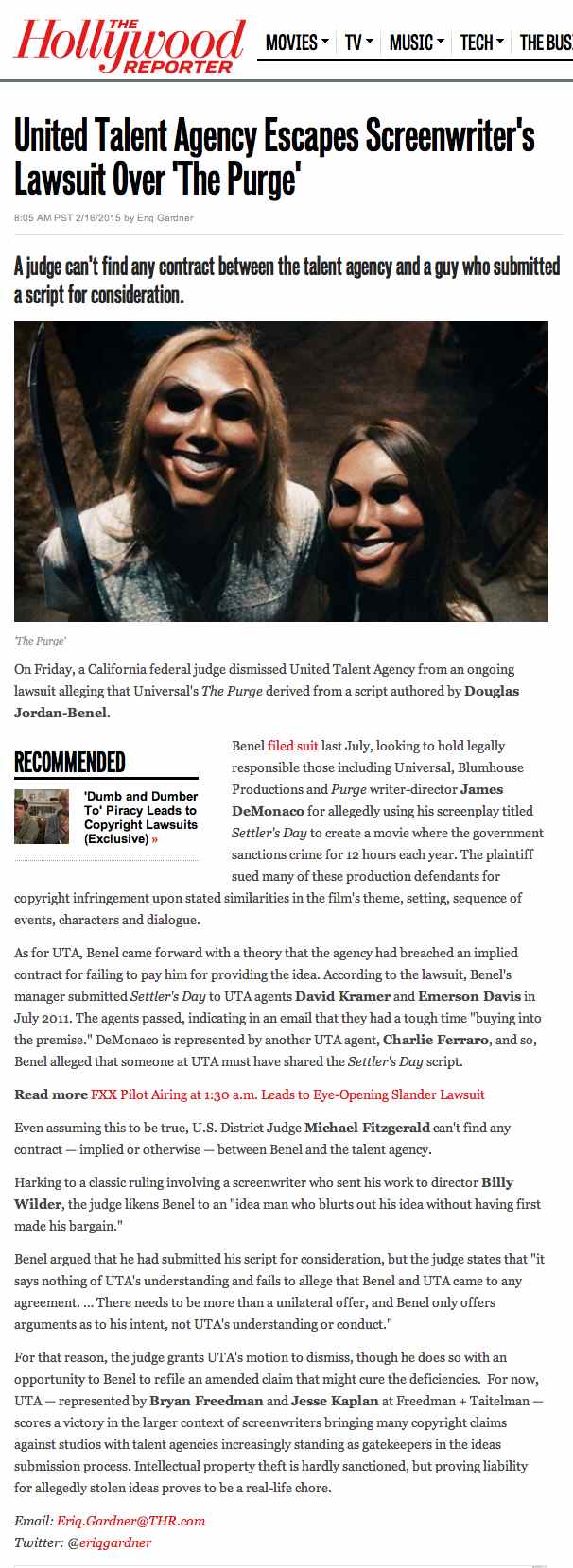A judge can’t find any contract between the talent agency and a guy who submitted a script for consideration.
On Friday, a California federal judge dismissed United Talent Agency from an ongoing lawsuit alleging that Universal’s The Purge derived from a script authored by Douglas Jordan-Benel.
Benel filed suit last July, looking to hold legally responsible those including Universal, Blumhouse Productions and Purge writer-director James DeMonaco for allegedly using his screenplay titled Settler’s Day to create a movie where the government sanctions crime for 12 hours each year. The plaintiff sued many of these production defendants for copyright infringement upon stated similarities in the film’s theme, setting, sequence of events, characters and dialogue.
As for UTA, Benel came forward with a theory that the agency had breached an implied contract for failing to pay him for providing the idea. According to the lawsuit, Benel’s manager submitted Settler’s Day to UTA agents David Kramer and Emerson Davis in July 2011. The agents passed, indicating in an email that they had a tough time “buying into the premise.” DeMonaco is represented by another UTA agent, Charlie Ferraro, and so, Benel alleged that someone at UTA must have shared the Settler’s Day script.
Even assuming this to be true, U.S. District Judge Michael Fitzgerald can’t find any contract — implied or otherwise — between Benel and the talent agency.
Harking to a classic ruling involving a screenwriter who sent his work to director Billy Wilder, the judge likens Benel to an “idea man who blurts out his idea without having first made his bargain.”
Benel argued that he had submitted his script for consideration, but the judge states that “it says nothing of UTA’s understanding and fails to allege that Benel and UTA came to any agreement. … There needs to be more than a unilateral offer, and Benel only offers arguments as to his intent, not UTA’s understanding or conduct.”
For that reason, the judge grants UTA’s motion to dismiss, though he does so with an opportunity to Benel to refile an amended claim that might cure the deficiencies. For now, UTA — represented by Bryan Freedman and Jesse Kaplan at Freedman + Taitelman — scores a victory in the larger context of screenwriters bringing many copyright claims against studios with talent agencies increasingly standing as gatekeepers in the ideas submission process. Intellectual property theft is hardly sanctioned, but proving liability for allegedly stolen ideas proves to be a real-life chore.
Email: Eriq.Gardner@THR.com
Twitter: @eriqgardner





